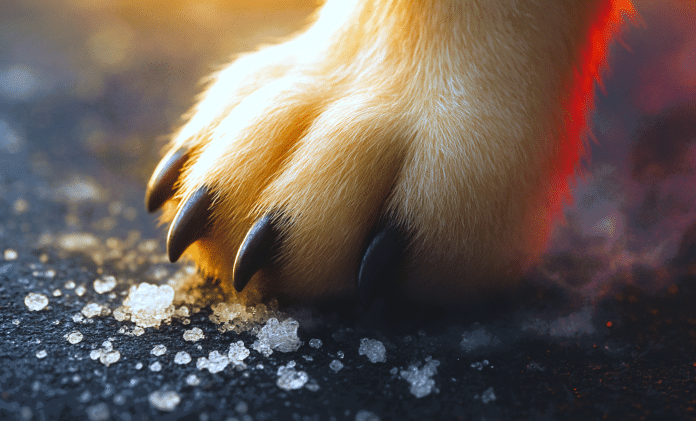Fargo, ND – As the first winter snow and subzero wind chills settle across North Dakota, veterinarians are urging pet owners to take precautions before heading outdoors. The road salt and de-icers used heavily across the state to keep highways and sidewalks safe can burn paw pads, irritate skin, and cause toxic reactions if pets lick or ingest them.
Most ice-melt products contain sodium chloride, calcium chloride, or magnesium chloride, chemicals that work effectively in extreme cold but are harsh on pets’ paws. Even brief contact can cause dryness, cracking, or chemical burns. When dogs lick their feet after exposure, they may ingest these substances, leading to vomiting, diarrhea, excessive thirst, or lethargy. In severe cases, salt poisoning can cause seizures or kidney damage.
Veterinarians note that the state’s long winters and heavy salt use mean repeated exposure is common. Some de-icers also include industrial byproducts or heavy metals, which can heighten toxicity with prolonged contact.
To prevent injury, veterinarians recommend rinsing paws with warm water after every walk and drying them thoroughly. Applying a paw balm or wax before heading outside helps create a barrier, and trimming fur between the toes reduces buildup of salt and ice. Booties can offer strong protection for dogs that tolerate them, and homeowners are encouraged to use chloride-free, pet-safe ice melts around their property.
With wind chills below zero and accumulating snow forecast through early next week, veterinarians urge owners to limit outdoor exposure and watch for limping, licking, or reluctance to walk on salted surfaces.
As winter tightens its grip on North Dakota, experts remind pet owners that the season’s greatest hazard to dogs may not be the snow—it’s the chemicals spread to melt it.





